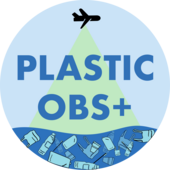Airborne monitoring for plastic litter detection represents a modern, universal observation method to address the urgent and rapidly increasing problem of plastic litter pollution on a global scale with ecological, social and economic implications. Remote sensing data from spectral and imaging sensors have the potential to significantly advance the detection of plastic litter in aquatic environments, close existing knowledge gaps regarding sources, distribution pathways and accumulation areas and enable regular and standardized monitoring.
PlasticObs+ aims to develop an integrated measurement system for the routine, quasi-synoptic detection and visualization of the distribution of plastic waste on the water surface and on shorelines or coastal strips in a situational picture using innovative AI technologies and modern remote sensing (e.g. aircraft or drones).
The developed measuring system can be easily integrated into existing systems of existing platforms that are used for routine flight investigations (oil monitoring, marine monitoring or environmental monitoring, coastal protection). This makes it possible for the first time to profitably expand the range of tasks of these missions and corresponding remote sensing projects worldwide. This flexibility also extends to the downstream processing chain: the automatic evaluation of the remote sensing data collected during routine flights with regard to the detection and characterization of plastic is realized by means of machine learning workflows, micro-cluster analysis and other AI methods and is then incorporated into a specially developed, publicly accessible AI library, which contains not only data sets but also methods for the automated detection and classification of plastic from various sensor data. This will be made available to developers and operators of remote sensing systems worldwide via repositories and publications. The use of pre-trained neural networks and the ability to "self-learn" will enable the system to be optimally adapted to regional circumstances and issues worldwide from the outset (e.g. with regard to dominant waste categories or variable environmental parameters).
PlasticObs+ aims to support a community that uses artificial intelligence for the benefit of the environment and people, far beyond the specific fields of application of the project. In addition, analysis results are processed and presented in distribution and frequency maps. The development of a central geo-portal, in which the results are available as a web map service, is accessible to the general public as well as to involved stakeholders and responsible public authorities in order to promote sustainable solutions to environmental pollution and targeted, effective counter-strategies. PlasticObs+ will thus serve as a global model for how innovative AI technologies and intelligent sensor technology can contribute to environmental protection.
The PlasticObs_plus funding code is 67KI21014A. Funded by the Federal Ministry for the Environment, Nature Conservation, Nuclear Safety and Consumer Protection (BMUV) on the basis of a resolution of the german federal parliament.
Further information on the funding guideline for "KI-Leuchttürme", in which the project is funded, can be found on the pages of the BMUV and the ZUG .
Partners
- OPTIMARE Systems GmbH
- everwave GmbH
- Jade Hochschule


